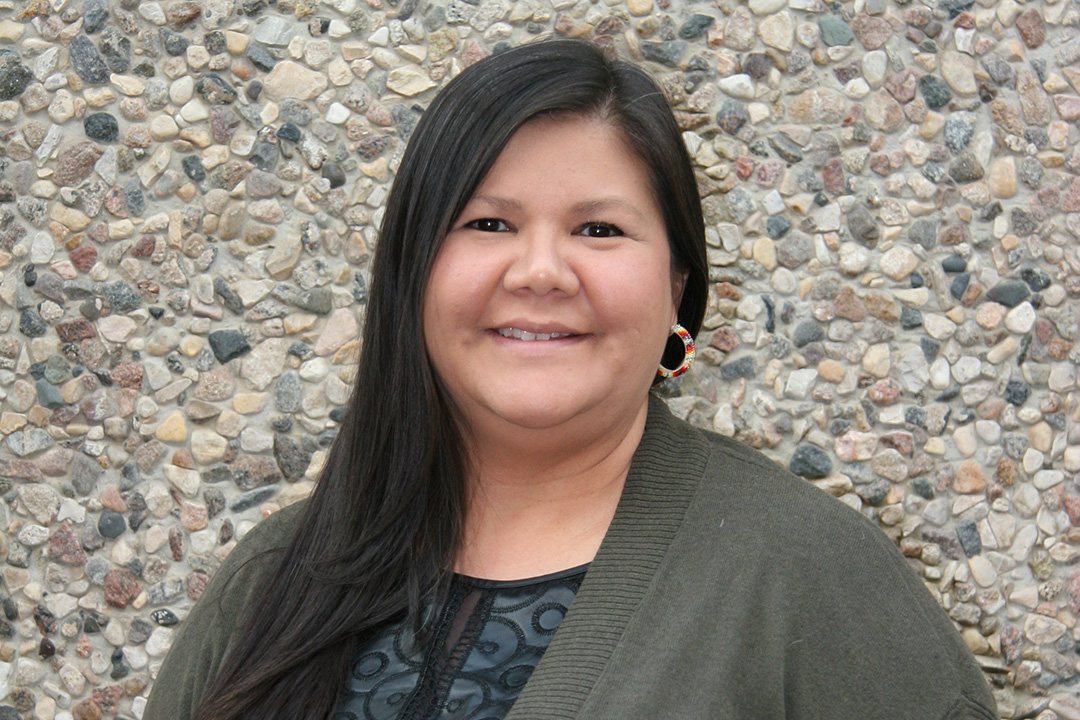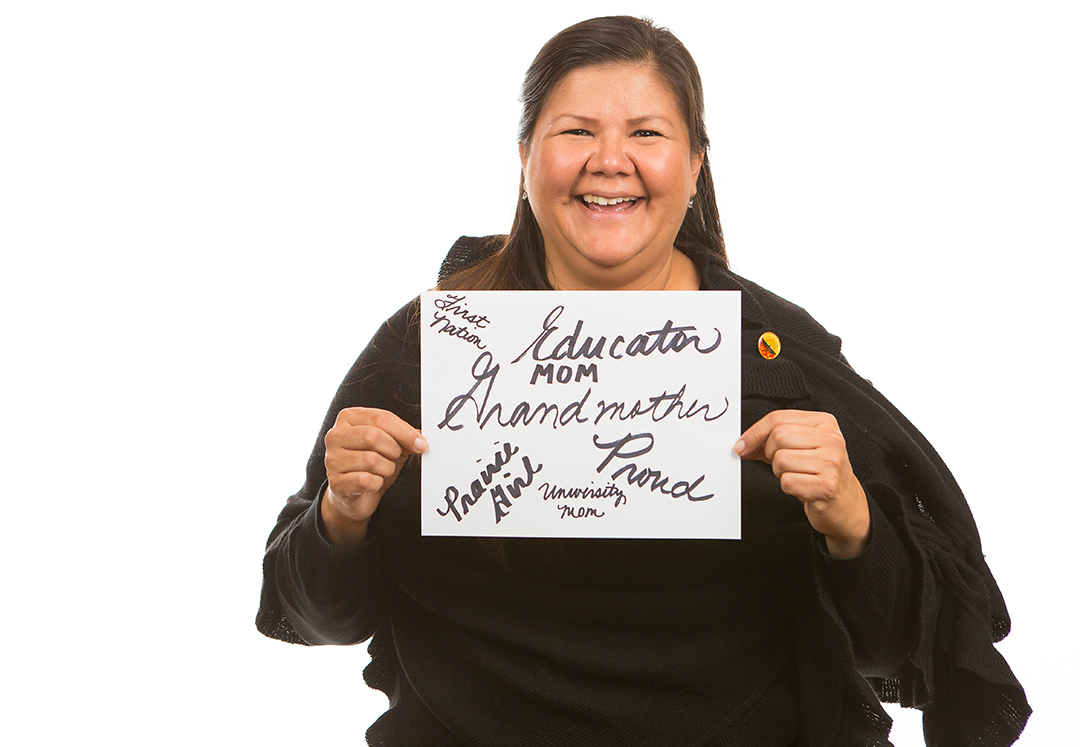
Indigenous education at USask focused on relationships and building leaders
For Yvette Arcand, the Indian Teacher Education Program’s (ITEP) 48-year success as a national leader in Indigenous education at the University of Saskatchewan comes down to one thing: a sense of family.
By Meagan Hinther“Just as you would go to a family member for help, it’s the same kind of family setting within ITEP. We try to guide our students, like an aunt would guide their nephew and niece. And I think that’s what sets us apart from other programs,” said Arcand.
From the community of Beardy’s and Okemasis Cree Nation within Treaty 6 territory, Arcand started her education journey at USask in 1991 as an ITEP student in the College of Education, and has worked for the program for the past 22 years in various roles. Now, as the acting ITEP director, her primary focus continues to be cultivating that sense of family, albeit virtually.
“We want to make sure that our students are feeling really supported so they know that they can be successful. First Nations are all about those personal relationships. So how do you navigate those personal relationships via WebEx?” said Arcand.
To help their students with virtual learning, ITEP leadership worked with the College of Education to develop two new remote support coordinator positions—staff with roles entirely devoted to building connection.
“They are supporting our students through technology and, for lack of a better word, issues that a student may have, to be successful. Maybe being socially isolated, the lack of technology for some of our students, they may have their children at home. There are all those challenges that come along with being a student during the pandemic,” said Arcand.
In addition to the two new support roles, Arcand is welcoming new ITEP mentor instructor staff Lori-Ann Daniels and Jade Ryan to the team. Both are ITEP alumni and joined the program from the College of Education’s undergraduate programs office in early September.
Daniels is Dakota and Cree from Okanese First Nation, and a proud mother and grandmother to four adult children and one granddaughter. Ryan is of Mi’kmaq, Irish and French descent from families in Guysborough and Pictou County, Nova Scotia and is the proud mother of two children that are community members of Pelican Narrows (Peter Ballantyne Cree Nation). The two started as summer students in ITEP and Arcand shared how they’ve come full circle.
“Both Lori-Ann and Jade are coming in with a wealth of experiences and gifts that they bring to our students,” said Arcand. “Lori-Ann completed her master's at the U of S as well. She was a teacher, a principal, a superintendent, curriculum developer, field experience coordinator and currently a university instructor. And for Jade, she is also returning to us. She was a previous advisor, and brings experience as a teacher, a field co-instructor working in the North, and as a current master’s student in the Department of Educational Foundations.”
Building a culture of inclusion and support for Indigenous staff and students on campus
When recalling her first time on campus in 1991 as a prospective ITEP student, Arcand shared a memory of getting lost.
“I took the bus to campus, I had small children at home, and it was a place that was foreign to me. I didn’t see any other Indigenous faces and I didn’t want to ask for directions because I didn’t want anybody to assume that I didn’t belong,” said Arcand.
Eventually, she found the College of Education building and met then ITEP mentor and future College of Education faculty member Verna St. Denis (PhD) for an interview.
“Verna made me feel very welcomed, and I found out later that we were from the same community. She was a graduate of the program, and a mentor/instructor. And I felt really good, and I was able to see myself as a potential student,” said Arcand.
Because she felt so welcomed in ITEP, Arcand used to visit with staff in the program’s office for coffee. Over time, she began working there part time as she finished her degree and continued to do so following graduation, while working for Wanuskewin in the role of park interpreter.
“I saw that our knowledge and that our history needed to be shared,” said Arcand. “Though I didn’t want to leave ITEP, I needed to go and make it out in the world and practice some of the teachings that were gifted to me. I was able to go back into my community and work as a teacher there for a couple of years,” said Arcand.

The pull to return to ITEP full time never left Arcand. In 1998 she came back to the University of Saskatchewan in the role of ITEP advisor, guiding students for the next 11 years and progressing to associate director in 2007.
Over the years, she has been a part of the grassroots-driven supports that have helped Indigenous staff and students feel more welcomed.
“When I started working at the university, I noticed that the number of our Indigenous staff was quite low and that they were not staying,” recalled Arcand. “In discussion with each other, we said, you know what? We need to support one another.”
That staff support network started as a small group of 10 Indigenous staff from across campus meeting for coffee in 2002. It has grown into a formalized group of more than 63 that reports regularly to the Vice Provost, Teaching, Learning and Student Experience and to the Vice Provost, Indigenous Engagement.
“We’re advocates for Indigenous students. Because when we feel supported as staff by the university, we are able to support our students a lot more,” said Arcand.
For Arcand, having Indigenous role models at the university increases an Indigenous student’s confidence and belief in themselves, and this has a cascading effect on the people that particular student encounters throughout their lives.
Cultural immersion key to ITEP student success
As an ITEP student thirty years ago, Arcand learned about what the program stood for from Dr. Cecil King, an Odawa from Wikwemikong, a celebrated Indigenous education advocate and ITEP’s founding director.
“When I started, Dr. Cecil King was one of my first instructors. I remember sitting in the front row, and Dr. King is a tall, big man, and he has such powerful words,” recalled Arcand.
“The class was equivalent to our current anti-oppressive education class and he talked about Indian control of Indian Education and educating First Nations people to become teachers. He talked about how we were needed. If education did this to us, education could bring us back from it,” said Arcand.
Established in 1972 in the College of Education by leaders such as Dr. King, ITEP has a long history of excellence in Indigenous education, both at USask’s main campus and through its partnerships in First Nations communities across Saskatchewan.
Over the past six years, the College of Education has supported growth in ITEP staff, doubling the number of staff positions, increasing the operations budget, expanding the cultural immersion opportunities and facilitating off-campus partnerships, many in collaboration with ITEP leadership. Class sizes in ITEP remain smaller, ensuring that students experience fewer challenges in the transition to post-secondary education.
College of Education dean Dr. Michelle Prytula (PhD) fully appreciates that the program’s success is due to the strengths of former and current staff, and their commitment to students.
“Under Yvette’s leadership, the ITEP team continues to focus on what has always been a number one priority – supporting and fostering student success through education that is relevant to the worldviews, values, philosophy and needs of First Nations people,” said Prytula. “And that has been the case throughout ITEP’s history. ITEP graduates, who serve in a variety of roles as teachers and leaders worldwide, deservedly feel a sense of pride in the program and its legacy.”
A key focus of the program are the teachings that immerse students in First Nations culture and guide them on how to infuse Indigenous knowledge into school curriculum and their future classrooms, ensuring the survival of culture as they go on to educate the youth of communities throughout Canada and internationally.
With cultural camps occurring in each of the four seasons, students are learning from Elders and Indigenous Knowledge Keepers out on the land year-round. They carry this knowledge and leadership into the classroom and their communities. The program has more than 1,500 Indigenous alumni working in communities across Canada and worldwide, as teachers, student union presidents, entrepreneurs, artists, Chiefs and in many other community-facing roles.
Arcand takes pride in the role ITEP has of shaping community leaders and will continue to make that her focus in her own role as leader, one that she approaches with grace and humility.
“I don’t necessarily see the director as a leadership role. I’m here to guide and mentor students,” said Arcand. “When I think about leaders, we’ve had so many leaders. Students are our leaders. We answer to not only our students, but to our community. I’m here to navigate that process.”
